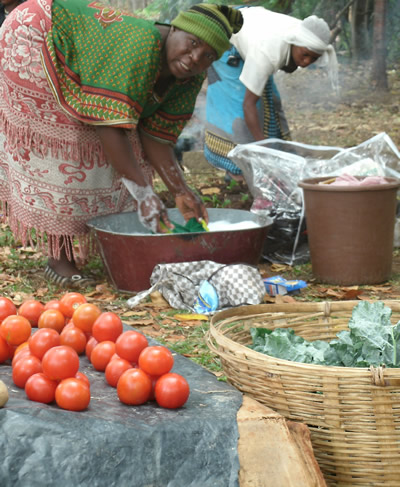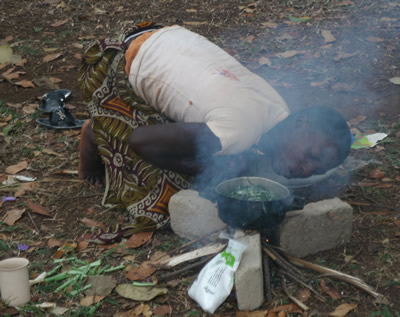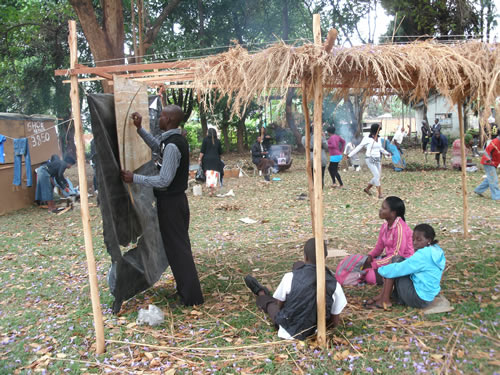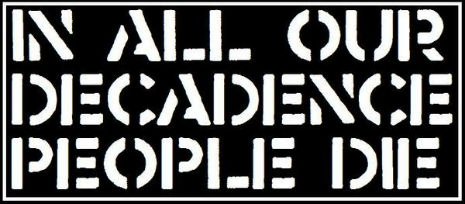Archive for the 'Uncategorized' Category
What’s a fair wage in Zimbabwe?
Thursday, October 6th, 2011 by Bev ClarkI feel these gazetted wages are fair on the employee as these domestic workers deserve the best as well. One thing people should realise is out there in SA, the States, Britain etc, hama dzedu mamiads and they have been sending money back home & they tell you kuti ndirikutambira zvinoenderana neni. Isusu muno muZim we feel a maid mumwe munhuwo tinomuoona as a second class citizen. These domestic workers are abused mudzimba umo & on top of that opihwa mari shoma. On the other hand these gazetted wages are not fair on the employer because, the monthly salaries that people are earnign are not enough. One can’t spare a $100 on a maid then arnd $100 for ZESA then another $100 on your water bills yave marii, $300, tell me who can afford to dispose such huge amounts on a monthly basis, apa hatina kutaura rent coz majority of the people are tenants. The equation is just not working out. Hameno ministry of labour kuti ukufugnei but I feel they should adjust these salaries across the board, munhu wese needs an increment.
- Sandra, Kubatana subscriber
In the last edition of our Kubatana newsletter we included the recently gazetted wage increases for domestic workers in Zimbabwe. Pretty much unlivable wages don’t you think?
But the response that we got was unanimous in saying that wages are so low across the board that its unsurprising that employers can’t afford to pay domestic workers more. What do you think?
Government has set wages and conditions of service for domestic workers in a move that will result in the highest-paid such worker earning $100 per month. The new wages and working conditions were approved by Cabinet recently and are with effect from October
Domestic workers – including child minders, cooks and gardeners – will now be paid between $85 and $100. Workers not residing with their employers are now entitled to accommodation, transport, electricity and fuel or cooking allowances. A yard worker or gardener will now get $85 per month or a weekly wage of $19,60, while a cook or housekeeper is now entitled to $90 per month or $20,79 per week.
Those domestic workers looking after the disabled had their wages pegged at $95 per month or $21,94 per week.
Some domestic workers with Red Cross certificates or similar qualification who take care of the disabled and the aged are paid $100 or $23,10 per week. Those who do not stay with their employers are now entitled to monthly allowances of $50 accommodation, $26 for transport, $5 for lights, $5 for fuel or cooking and $5 for water.
~ An extract from The Herald, 29 September 2011
A digital world without Steve Jobs
Thursday, October 6th, 2011 by Lenard KamwendoI never liked Apple products up to the time when I bought my first iPod player and then later when I was introduced to iTunes. Due to the high costs of Apple products many people with a passion for technology in Zimbabwe have been restricted to HP and Dell products, but that changed when Apple started to launch its wide range of products including the iPod, iPhone, iPad and the iMac thanks to the work of Steve Jobs. Born in 1955 Steve Jobs co-founded Apple Inc, a company which has made computers accessible to non technical people and reinventing the cellphone and music industry with the iPhone and iTunes. Steve Jobs inspired so many young people through entrepreneurial skills and ideas which have revolutionarised the way we see technology and how to make it work for us. The world was made better because of Steve Jobs.
Reacting to Steve Jobs’s death the American President, Barack Obama he said,
“Steve was among the greatest of American innovators – brave enough to think differently, bold enough to believe he could change the world, and talented enough to do it. By building one of the planet’s most successful companies from his garage, he exemplified the spirit of American ingenuity. By making computers personal and putting the internet in our pockets, he made the information revolution not only accessible, but also intuitive and fun. And by turning his talents to storytelling, he has brought joy to millions of children and grownups alike. Steve was fond of saying that he lived every day like it was his last. Because he did, he transformed our lives, redefined entire industries, and achieved one of the rarest feats in human history: he changed the way each of us sees the world.”
After his death Steve Jobs shall be remembered many generations to come for his immense contributions to the information technology revolution and for the inspiration he gave to others – even his rivals.
The impact of Zimbabwe’s mass evictions on the right to education
Wednesday, October 5th, 2011 by Upenyu Makoni-MuchemwaAmnesty International Zimbabwe today held a press conference launching a report titled Left Behind: The impact of Zimbabwe’s mass forced evictions on the right to education. The report is based on research assessing the level of access to education at Hatcliffe Extension and Hopely, two settlements created by the government under Operation Garikai, which Amnesty International Zimbabwe has been monitoring since 2005.
Under Operation Garikai, the government provided a small proportion of the 700 000 victims of forced evictions either with houses that were not fully constructed or with un-serviced plots of land, on which those who were resettled were permitted to build houses without receiving any further government assistance. Both Hopely and Hatcliffe extension did not have access to government amenities such as health, education, water or electricity. The majority of households were allocated plots by the government were unable to build decent shelter, and were living in plastic shacks or other poorly constructed structures.
The data presented, was collected between December 2010 and August 2011. Interviews were conducted with 83 individuals, including children, young people, parents and guardians of children affected by Operation Murambatsvina and living in the settlements. Teachers and volunteers at community schools, NGO workers, members of teacher’s trade unions and representatives of UN agencies were also interviewed. The report estimates that at Hopely there are about 2000 children attending makeshift schools constructed and staffed by community members. While UN Special Envoy on Human Settlement Issues Anna Tibaijuka’s report estimates that Operation Murambatsvina estimates that Operation Murabatsvina disrupted the primary and secondary education of 222 000 children, Mwanza noted that a comprehensive study of how many children had lost access to education in Zimbabwe was yet to be done.
Speaking at the launch, Amnesty International Zimbabwe, researcher Simeon Mwanza said that Operation Garikai had been retrogressive to the right to Education. He added that the biggest issue faced by communities at Hatcliffe Extension and Hopely was that government had not made any deliberate investments into restoring livelihoods. The resultant food and financial insecurity made accessing education less of a priority. The long-term impact of this was that a significant proportion of Zimbabwean children, in particular those at Hopely and Hatcliffe, were condemned to a makeshift education. Mwanza stated that the people living in Operation Garikai settlements were excluded from government programmes and services, and Non-governmental organisations were struggling to provide for them. Communities in both settlements had made attempts to meet the need to educate their children by building makeshift schools. However, these had gone unregistered and were thus excluded from government support schemes such as the education transition fund and the per capita tuition grant. In instances where communities had attempted to register schools, they were met with resistance from government officials.
The report concludes:
Violations of economic, social and cultural rights for people living in Operation Garikai settlements, including violation so the right to education, have gone largely unnoticed mainly due to lack of a government mechanism to monitor the situation in these settlements and devise strategies to address human rights violations resulting from Operation Murambatsvina. The government has done little to genuinely consult with the affected communities in order to formulate interventions that address problems experienced by the victims. There is a huge gap between the reality as lived by the affected communities and the stated government policies to address the situation.
The people need meetings, not rallies
Wednesday, October 5th, 2011 by Mgcini NyoniI attended a National Youth Development Trust (NYDT) organized Youth Peace Convention on the 29th and 30th of September at the Zimbabwe Academy of Music, Bulawayo at which the only visible minister of the very toothless and useless organ on ‘National Healing’ spoke. But that’s not what I want to talk about.
On the second day we had representatives from ZAPU, MDC, MDC Tsvangirai and ZANU PF. The ZAPU and MDC guys were eloquent, but I have forgotten what they talked about; which means it was useless. The MDC Tsvangirai guy made a total fool of himself: He kept saying ‘the smaller MDC’ and referred to ZANU PF as the opposition party; implying that his party was the ruling party. Really? We must be the only country in the world where the ‘ruling party’ does not actually rule. I sat there getting very confused; if MDC Tsvangirai is the ruling party, why don’t they control the army and the police and everything else actually. He rudely dismissed the MDC and ZAPU and said their agenda as a party was ZANU PF, not the insignificant small parties. And I thought their agenda like all of us was Zimbabwe!
When it was the turn of the ZANU PF guy, Fundisani Dewa (youth secretary for economic affairs) to speak, he spoke eloquently about how he had spend the last two weeks in a ZANU PF prison. I happen to have remembered this guy’s name because I have known him for years and I didn’t know he was ZANU PF: But I should have suspected that his success was not hard-earned. I guess by mentioning that he was in prison, he was angling for our sympathy. He conveniently forgot that his arrest was totally different to the arrest we always cry about. Him and other youths have been taking over buildings in Bulawayo and that’s surely illegal and he deserved to be arrested. I guess he is bitter because ZANU PF does not arrest its own over something as ‘commendable’ as taking over white men’s property: Fundisani and others must be victims of the infighting that has rocked ZANU PF of late.
The question that we were left asking was that if ZANU PF can do that to its own, what’s in store for those who belong to the opposition parties. When the question of Gukurahundi was raised, he said we should let bygones be bygones. He hastened to add that he had been born in Khami prison during Gukurahundi and that he didn’t know his father. I guess his reasoning for being part of ZANU PF is that it can make him rich. Does it make sense? I am a victim of Gukurahundi myself and what I would want is Affirmative Action; we need to catch up to our Shona brothers who have had an undisturbed path to success. Fundisani is taking his Affirmative Action now and who are we to judge him.
I left the convention wondering if the people knew what their parties were all about and felt it was of urgent necessity to organize meetings between parties and the people. Not rallies, but meetings were people can engage their ‘leaders’ and bring them to account.













